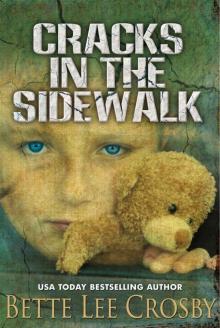- Home
- Bette Lee Crosby
Emily, Gone Page 10
Emily, Gone Read online
Page 10
“No, she works the early shift at the diner. She’ll be home at three, maybe three thirty. How about I have her call you back?”
It was five after eleven. Three o’clock meant four hours of waiting. “Can I call her at work?”
“Afraid not. Give me your number, and I’ll have her call as soon as she gets in.”
Vicki hesitated a moment, then gave him the number of the pay phone. “Tell her I’m sorry about not calling sooner, but this is really important, so she should call the minute she gets in, okay?”
As she hung up the phone, Vicki felt a pounding in her temples. What if Angela was now angry with her? What if she decided to do as Vicki had done and not bother calling back? What if she had to work late, or Kenny forgot to give her the message? There were dozens of what-ifs, and each one of them was like a tiny mallet hammering the thought into her brain. This was risky, and she knew it. If Murph came home early and discovered her missing, there was no way of knowing what he’d do. Call the police? Tell them she had the baby?
She wheeled the stroller over to the bench in front of the restaurant and sat, hopeful that Angela would call earlier. From this distance she could easily enough hear the phone ring, and she could see the clock outside the bank a few doors down.
An hour passed so slowly that Vicki began to wonder if the clock was working properly. The sun rose higher in the sky, beads of perspiration settled on her forehead, and Lara became fussy. Taking the baby from the stroller, Vicki tried playing some of the games that usually entertained Lara. This time she would have none of it. After several minutes of cranky whining, she broke into a loud squall.
By then it was past lunchtime, and she figured the baby to be hungry. Lifting Lara to her shoulder, she cooed, “Mama didn’t bring a bottle, sweetie; can you wait just a little while longer?”
The baby continued howling.
Finally, Vicki placed her back in the stroller and started for the food store at the end of the plaza. Her stride was long and her steps quick. She was in and out of the store within minutes, and without slowing she returned to her spot on the bench.
Opening the jar of bananas, she fed the baby as she had that first time, scooping tiny bits of food onto the tip of her finger and allowing Lara to suck them off. Once her little tummy was full, her eyelids grew heavy. Vicki cradled the baby in her arms and swayed back and forth in a rocking motion until Lara drifted off to sleep.
While she slept, there was little for Vicki to do except think. And worry. The minutes passed by in an impossibly slow manner until at last it was two o’clock. She still had another hour to wait. Hopefully not longer.
As she sat waiting, she prayed Angela would call. She also prayed Murphy would not make it back from Bardstown sooner than he’d thought.
At 2:45 Vicki slid the sleeping baby back into the stroller and walked across to stand beside the phone. From that vantage point she could no longer catch sight of the clock, and the minutes dragged by slower than ever. Twice she lifted the receiver and listened for a dial tone just to make certain the phone was working.
When the ring finally sounded, it was louder than she’d expected. She grabbed the receiver. “Angela?”
“My God, Vicki, where have you been? I just about went crazy trying to find—”
“Please don’t be angry with me,” Vicki said anxiously. “I meant to call, honestly I did, but with one thing and another . . .” She hesitated a moment, struggling with whether to tell the truth or not, then decided on a modified version of it. “When you wouldn’t let me come and live with you, I moved in with this guy—”
“Wait a minute,” Angela cut in. “I never said you couldn’t live with me. I said it had to wait until I got a place where I had my own room. I stayed with Patty Summers for most of that first year; she had a studio apartment, and I slept on her sofa.”
“Still, you never came back for me.”
“I did so! I can’t even count the number of times I called and left a message with Dad. I didn’t come to the house because I just couldn’t face him, not after what he did.”
Although Vicki had intended to bypass the bitterness, there were splintery thorns on the edges of her answer. “Well then, you shouldn’t be all that surprised to hear he tried it with me also.”
Angela gasped. “That bastard! What did you do?”
“What could I do? I left home.”
“I’m so sorry, honey—if you would have returned my calls or reached out to me, we could have—”
Vicki was nervous about the time and anxious to move on. “What’s done is done,” she said. “I’m hoping we can make up for it now.”
“Of course we can,” Angela replied warmly. “Would you like to come for a visit?”
“It might be more than a visit; I’m in kind of a fix and need a place to stay.”
“What happened?”
“I’ve got a baby girl now, and this—”
“A baby girl!” Angela shrieked. “How wonderful!”
Without giving her a chance to go any further, Vicki cut in. “The thing is, this guy I’ve been living with has a terrible temper. Sometimes he flies into a rage, and I’m afraid he’ll hurt—”
Angela gasped. “Oh no! Please tell me he hasn’t hit you!”
The thought of Murphy with his laughing eyes and sweet smile flickered in front of her eyes, but she willed it away and continued. “There were a few times, but it’s not me I’m afraid for—”
“You can’t stay with him,” Angela said, kicking into big-sister mode. “You know how it was with Daddy!”
“Yeah, I do. But other than you, there’s nobody—”
“You don’t need anybody else. You’re more than welcome to come stay with us. Kenny and I have a two-bedroom with an upstairs where we can finish off a third if we want.”
The offer was precisely what Vicki was counting on. “You sure Kenny won’t mind?”
Angela assured her it would be fine. “Kenny’s a great guy. He loves kids.”
They spoke for another ten minutes, and Vicki explained her plan. As she left the shopping center to return to the apartment, the thought of what she was about to do pressed hard against Vicki’s chest. She and Murphy had been good together. This wasn’t what she wanted, but he’d given her no choice.
A CHILD REMEMBERED
Margaret Wilson had been married to the sheriff for more than thirty years and knew his thoughts as well as she knew her own. When he came home with his brows knitted together and the veins in his neck bulging, she knew something was wrong.
“Bad day?”
He nodded. Without saying a word he headed for the kitchen, where he plunked three ice cubes in a glass, poured an inch of bourbon over them, then dropped down into the straight-backed chair at the table. Since it was obvious he wasn’t in the mood for dinner, Margaret lowered the flame on the green beans and sat across from him.
“Want to talk about it?”
He opened his mouth halfway as if to say something, then shook his head, lifted the glass, and took a swig.
“It doesn’t help,” he grumbled.
“What doesn’t help?”
He didn’t answer her question; instead he voiced his own thoughts. “How can an envelope just appear in a mailbox with nobody knowing anything about how it got there? Zack Cramer’s been working the Yellowwood route for a good five years. How can he not know what he did or didn’t put in the Dixons’ mailbox?”
News traveled fast in a small town like Hesterville, and the minute he mentioned the Dixon name, Margaret knew what was wrong.
“So what now?” she asked. “Can you find the person who wrote the letter?”
“It’s postmarked Culvert Creek, Kentucky. That’s not around the corner.”
Margaret knew there was more coming, so she waited.
“It’s a nine- or ten-hour drive, and the blasted town is so small they don’t have a law enforcement department. I had to call the Washington County sheriff to get any information.�
�
“And was he helpful?”
“Hell no. Said he couldn’t even look into it without having the envelope.” Wilson downed the last of the bourbon, then sat there with his finger twirling the ice cubes around the empty glass. “Said my best bet was to ask around town, see if the locals knew anything.”
“So is that what you’ll do?”
He gave a disgruntled snort and shrugged. “It’s a two-day trip. Ten hours there, another ten coming back, and there’s no guarantee I’ll find anything.”
Margaret raised an eyebrow and eyed him with a look that was more doubt than agreement.
“Maybe not, but if you don’t go, you’ll never know.” She stood, turned back to the stove, and started the beans bubbling again. “Dinner’s in fifteen minutes.”
That evening Wilson went to bed at ten o’clock, the same as always, but sleep was impossible to come by. He tossed and turned for hours, then plumped his pillow three different times. When nothing seemed to work he gave a sigh so thunderous it woke Margaret.
She snapped on the light and sat up. “What’s wrong?”
“I can’t sleep. This Dixon case has got me thinking about Becky.”
“Becky?” She gasped. “Good grief, Carl, our Becky wasn’t kidnapped! She died of diphtheria, and that was some twenty-seven years ago.”
“I know, but losing a child is a thing you never forget.”
“Well, of course you don’t forget, but you move on. I spent more hours than I can count crying over Becky, but in time I made my peace with God. You’ve got to do the same, Carl.”
“I have, Margaret. Still, I can’t help thinking we at least had a chance to say goodbye to our baby; the Dixons haven’t even gotten that.”
“Emily is not dead! She’s missing! And I sincerely doubt Rachel Dixon has given up hope that her daughter will be returned!”
“I suppose you’re right . . .”
“I don’t suppose; I know!” Margaret said, then she snapped off the light.
Wilson spent the remainder of the night thinking about whether or not he should go to Culvert Creek. He dreaded the long drive and tried to convince himself that this too would turn up nothing of value. The envelope was not remarkable in any way: no return address, an ordinary six-cent stamp, and no identifiable fingerprints. The notepaper was without a watermark, so it could have come from any stationery shop. As he lay there staring up at the ceiling, he could think of a dozen reasons for not going to Culvert Creek but only one reason for going.
Rachel Dixon.
He pictured the worn look on her face, the hollowed-out sadness of her eyes, the way her lip trembled as she pleaded for him to find her baby, and he knew that all the arguments for not going dwarfed in comparison. As long as there was a splinter of hope, he had to go.
In the morning when he woke, Margaret was gone from the bed, and the smell of bacon was coming from the kitchen. She heard the sound of him stirring and called out, “Hurry up, sleepyhead, breakfast is almost ready.”
When he sat at the table, she sat across from him. “I’ve filled a thermos with coffee and made some sandwiches for the road.”
He looked up, his eyes crinkling at the corners. “How’d you know—?”
She lifted the mug of coffee, took a sip, and smiled. “I’ve never known you to not do the right thing.”
Early that afternoon Margaret drove out to the Dixon house with a freshly baked cake. Before she could rap on the door, it swung open.
Mama Dixon held her finger to her lips and made a soft shushing sound. “Rachel’s napping,” she said.
Margaret held out the cake and lowered her voice to little more than a whisper. “This is one of Carl’s favorites, and I thought maybe . . .” Her words fell away when she saw Rachel standing behind Helen.
Rachel was thin as a shadow and her expression almost as dark. She was wearing a faded T-shirt and jeans that were at least two sizes too big. “Did he find Emily?” she asked. Although there was the tiniest bit of hope clinging to the question, her voice had the hollow sound of an echo.
“It’s too soon to know,” Margaret replied. “Carl’s on his way to Culvert Creek, but he won’t get there until later this afternoon.” As she stood looking at Rachel’s worn face, she recognized a long-ago version of herself.
Without waiting for an invitation, Margaret strode in and handed Helen the cake. “If you wouldn’t mind, coffee would go nicely with that.” She hooked her arm through Rachel’s and steered her toward the sofa.
“It’s n-nice of you to come,” Rachel stammered, “but I’m afraid I’m not very good company these days.”
“You’re not expected to be,” Margaret replied. “You’re going through a hellish time, and you’re entitled to feel as miserable as you want.”
A look of surprise took hold of Rachel’s face. “Why would you say—”
“Because I’ve been where you are, and I know how it feels.” Margaret told of how they’d lost Becky and how she had suffered through a heartache much the same as Rachel. “Of course in your case, it’s different,” she said. “You’ve still got hope.”
“I try to remember that and hold on to the belief that they’ll find her . . .” Rachel hesitated for a long moment, the words stuck in her throat. She sucked in a laborious breath, then continued. “But it’s been a month, and with every day she’s gone, the probability of finding her lessens.”
Margaret reached out and took Rachel’s hand in hers. “That may be true in some cases but not all. Carl says the slimmest lead can sometimes turn out to be the break you need.”
“Really?”
“Yes. And I can say for a fact, when he’s working on a case like this, he’s like a hungry dog with a steak. He just doesn’t let it go.”
The stiffness in Rachel’s face eased ever so slightly. “So you think he’ll find Emmy?”
“I think if it’s humanly possible to find her, Carl will be the one to do it.”
For a short while that afternoon, Rachel’s spirits were lifted. Listening to Margaret tell of how the sheriff had overcome one obstacle after another, she could close her eyes and imagine him standing at the door with Emmy in his arms. She could again imagine the feel of Emmy’s head against her shoulder and hear the sound of her musical laugh.
When Helen served coffee, the three women sat at the kitchen table. Rachel picked at the edges of the cake and ate a few pecans, which was more than she’d done on previous occasions.
That evening when George returned home from the store, Rachel told him about Margaret Wilson’s visit. “The sheriff’s gone to Culvert Creek to find the person who wrote that letter.” She hesitated a moment, then, allowing some of Margaret’s optimism to rub off on her, added, “I think this might be the lucky break we’ve been waiting for.”
George eyed her with a raised eyebrow. “Is that what Margaret said?”
“Not exactly, but she was very positive about the sheriff finding Emmy. I wouldn’t be one bit surprised if we get a call from him tonight.”
George felt a prickly pinch of apprehension take hold at the back of his neck. He’d seen Rachel grow worse as each lead turned into yet another disappointment, and he was wary of it happening again. “I think it’s too early to get your hopes up,” he warned.
Her expression stiffened. “Do you have to be so negative?”
“I’m not being negative. I’m being honest. I’m hoping for Emily’s return as much as you are, Rachel, but we’ve watched so many of these leads turn into disappointments. Every time a promising lead turns into a dead end, I see how it carves out another little piece of your heart. It’s bad enough that we’ve lost Emmy; I don’t want to lose you also.”
Rachel’s eyes became watery, and her words were garbled by the throaty sound of a stifled sob. “We haven’t lost Emmy,” she said. “Sheriff Wilson will find her.”
“God knows I hope so.” George moved toward her and held his arms open, but she turned and walked away.
When
they sat down to dinner with Mama Dixon, Rachel was wearing her resolve like a suit of armor, her face a rigid mask of determination and her eyes deliberately avoiding George’s. He ate, but she didn’t even make a pretense of it. “That cake filled me up,” she said and pushed the plate away.
Sensing the tension in the air, Mama Dixon left earlier than usual that night, and once she was gone Rachel stationed herself in the club chair closest to the telephone.
George sat across from her on the sofa. He read the newspaper, watched television for a while, then stood and crossed over to where Rachel was sitting.
“It’s after eleven; let’s go to bed.” He offered his hand, hoping Rachel would take it.
Without looking up, she shook her head. “You go ahead; I’m waiting for a telephone call.”
With a huff of frustration he turned and walked into the bedroom, leaving her alone in the living room.
As she watched him go, Rachel’s heart seized. The crack that had opened up when she discovered Emmy gone suddenly grew wider and deeper. She wanted to turn back the hands of time, allow that moment to happen all over again. This time she would look up; this time she would take the hand that was offered. She no longer wanted to be alone in the chair, waiting for the telephone call that might never come. Her eyes filled with water, and despair snatched away the small fragments of hope she had mustered.
The thoughts that closed in on her were as dark and angry as storm clouds. How could it happen that in a single month, her life had turned to shambles? Emily gone. George angry with her. When the tears began, she lowered her head and covered her face with her hands.
She didn’t see George return; she felt it when he knelt in front of her and pulled her hands away from her face. His eyes looked into hers, not angry or judgmental but filled with kindness and understanding.
“This isn’t a war of who’s right or wrong,” he said. “We want the same thing, Rachel. We both want Emmy home. If it were within my power to make that happen, I would do it regardless of cost. I would trade my life for Emmy’s in a heartbeat, if it would bring her home, but it won’t. The only thing I can do now is pray for a miracle, pray that through the grace of God she is returned to us.”

 Emily, Gone
Emily, Gone A Million Little Lies
A Million Little Lies Previously Loved Treasures
Previously Loved Treasures The Loft
The Loft Spare Change
Spare Change Memory House: Memory House Collection (Memory House Series Book 1)
Memory House: Memory House Collection (Memory House Series Book 1) Silver Threads
Silver Threads Wishing for Wonderful: The Serendipity Series, Book 3
Wishing for Wonderful: The Serendipity Series, Book 3 The Summer of New Beginnings: A Magnolia Grove Novel
The Summer of New Beginnings: A Magnolia Grove Novel The Regrets of Cyrus Dodd
The Regrets of Cyrus Dodd Passing Through Perfect
Passing Through Perfect Baby Girl
Baby Girl Jubilee's Journey
Jubilee's Journey Beyond the Carousel
Beyond the Carousel What the Heart Remembers
What the Heart Remembers Cupid's Christmas
Cupid's Christmas Cracks in the Sidewalk
Cracks in the Sidewalk Blueberry Hill
Blueberry Hill The Twelfth Child
The Twelfth Child A Year of Extraordinary Moments (A Magnolia Grove Novel)
A Year of Extraordinary Moments (A Magnolia Grove Novel)